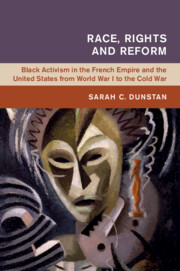 Race, Rights and Reform
Race, Rights and Reform Published online by Cambridge University Press: 01 March 2021
This chapter explores the ways that key black intellectuals from the United States and the French imperial nation-state sought to configure the relationships between racial and national belonging and political access to citizenship rights in the immediate aftermath of World War I. While being black meant something different in the respective contexts of the US and France, a shared sense of exclusion on the basis of race brought these thinkers together. More often than not, they also agreed with the United States' President Wilson's vision of the right to self-determination as the province of civilized men, and their activism during this period was motived by a desire to demonstrate that ethnicity was neither a marker of civilizational capacity nor of nationality. Such consensus did not automatically translate to transnational activism nor to international black solidarity.
To save this book to your Kindle, first ensure [email protected] is added to your Approved Personal Document E-mail List under your Personal Document Settings on the Manage Your Content and Devices page of your Amazon account. Then enter the ‘name’ part of your Kindle email address below. Find out more about saving to your Kindle.
Note you can select to save to either the @free.kindle.com or @kindle.com variations. ‘@free.kindle.com’ emails are free but can only be saved to your device when it is connected to wi-fi. ‘@kindle.com’ emails can be delivered even when you are not connected to wi-fi, but note that service fees apply.
Find out more about the Kindle Personal Document Service.
To save content items to your account, please confirm that you agree to abide by our usage policies. If this is the first time you use this feature, you will be asked to authorise Cambridge Core to connect with your account. Find out more about saving content to Dropbox.
To save content items to your account, please confirm that you agree to abide by our usage policies. If this is the first time you use this feature, you will be asked to authorise Cambridge Core to connect with your account. Find out more about saving content to Google Drive.